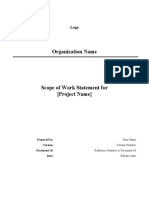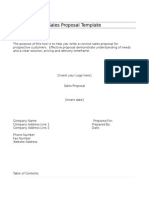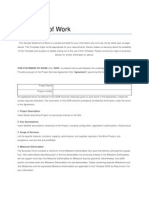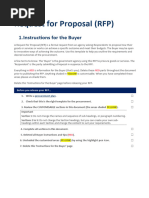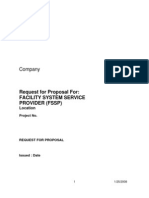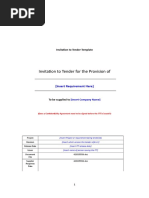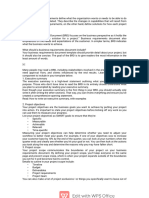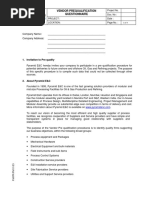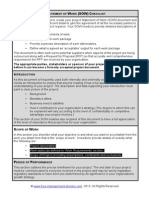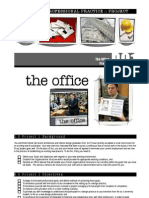0 ratings0% found this document useful (0 votes)
RFP Template
Uploaded by
asifbhuiyan.saffronCopyright:
© All Rights Reserved
Available Formats
Download as DOCX, PDF, TXT or read online from Scribd
Download as docx, pdf, or txt
RFP Template
Uploaded by
asifbhuiyan.saffron0 ratings0% found this document useful (0 votes)
Copyright
© © All Rights Reserved
Available Formats
DOCX, PDF, TXT or read online from Scribd
Share this document
Did you find this document useful?
Is this content inappropriate?
Copyright:
© All Rights Reserved
Available Formats
Download as DOCX, PDF, TXT or read online from Scribd
Download as docx, pdf, or txt
0 ratings0% found this document useful (0 votes)
RFP Template
Uploaded by
asifbhuiyan.saffronCopyright:
© All Rights Reserved
Available Formats
Download as DOCX, PDF, TXT or read online from Scribd
Download as docx, pdf, or txt
You are on page 1/ 14
Request for Proposal [SHORT]
RFP: Proposal Due By: Company Name:
Project Overview:
Project Goals:
● Goal 1
● Goal 2
● Goal 3
Scope of Work:
[Describe Scope of Work in Greater Detail]
Current Roadblocks and Barriers to Success
● Roadblock 1
● Roadblock 2
● Roadblock 3
Evaluation Metrics and Criteria
● Criteria #1
● Criteria #2
● Criteria #3
Submission Requirements
● Requirement #1
● Requirement #2
● Requirement #3
Project Due By: Budget:
Contact: Email: Phone #:
Request For Proposal
[LONG]
[PROJECT TITLE]
[COMPANY NAME]
PROPOSALS DUE BY: [DATE PROPOSALS WILL BE ACCEPTED UNTIL]
Company Background
This shouldn’t be a long history of your company. Rather, it should
give contractors a better idea of what your company does and who
you serve as a target market.
[EXPLAIN COMPANY IN 1-2 SENTENCES]
Project Overview
Before you go into the specifics of your company, you should give a
brief introduction to the project itself so vendors know right away if
it’s something worth bidding on.
[EXPLAIN PROJECT OVERVIEW IN 1-2 PARAGRAPHS]
Project Goals
Clearly identify what you hope to accomplish with this project and
what you see as a “win” so everyone is on the same page.
The goals of this project include:
i. [INSERT COMPANY GOAL #1]
ii. [INSERT COMPANY GOAL #2]
iii. [INSERT COMPANY GOAL #3]
To reach these goals, [YOUR COMPANY] is now accepting bids in
response to this Request for Proposal.
Scope of Work
The details of the project are essential in an RFP. In the same way
you don’t want to use vague questions, a vague project scope won’t
help you find the right vendor either. Spend time really detailing
your project scope so there’s no surprises later on.
Include a description of the project and a detailed scope of work
here. The description can be in paragraph form, a bulleted list, or a
combination of both.
[EXPLAIN SCOPE OF PROJECT IN A FEW SENTENCES AND/OR BULLET
POINTS.]
Target Deliverable Schedule
Do you have a target deliverable schedule in mind? This needs to be
included in your RFP so potential vendors can properly gauge if they
have the resources and bandwidth to complete the job on time.
Final Project Due: [PROJECT DUE DATE]
The expected project completion date is [ADD DATE]. If this date
needs to be adjusted, please include your readjusted proposed date,
as well as your reasoning for shifting the schedule. All proposed date
changes will be considered.
Existing Roadblocks Or Technical Issues
Here, you’ll want to outline any time, resources, or other constraints
that will affect both the proposal and the project.
A successful RFP is clear about any technical issues or possible
roadblocks, such as: Are you dealing with custom coding or an
outdated platform? Does your team have limited resources?
By explaining these up front, potential vendors will know exactly
what they’re getting into. You’ll weed out contractors who can’t
handle the task due to those constraints, but you’ll also connect
with companies that know how to work around these common
issues with skill and finesse.
Remember, it’s far better to find this out now than after you’ve
accepted the bid and started work.
[OUTLINE YOUR ROADBLOCKS OR TECHNICAL CONSTRAINTS.]
Budget Constraints
It’s important to be upfront with your budget. The more you can
eliminate surprises, the better for all parties involved.
[ENTER TARGET BUDGET AND/OR BUDGET CONSTRAINTS.]
Evaluation Metrics
How will you ultimately determine which contractor is the best fit for
this project. List which criteria you will consider when choosing the
company, you will ultimately hire.
[YOUR COMPANY] will evaluate bidders and proposals based on the
following criteria:
● Previous experience/past performance history.
● Samples and/or case studies from previous projects.
● Projected costs.
● Experience and technical expertise.
● Responsiveness and answers to questions in the next section.
Questions Bidders Must Answer to Be Considered
Create thought-provoking questions related to this project so you
can properly assess potential vendors. You might want to know
what issues a contractor sees up front or how the costs will break
down.
Consider asking questions that you would in person or over the
phone. List the questions bidders must answer in order to be chosen
(or even considered).
i. [INSERT QUESTION #1]
ii. [INSERT QUESTION #2]
iii. [INSERT QUESTION #3]
Submission Requirements
Aside from required questions to answer and evaluation metrics,
what will ultimately be necessary in order for the proposal to be
considered?
Bidders must adhere to the following guidelines to be considered:
● Only bidders who meet all 5 metrics in the evaluation section
should submit a proposal.
● Proposals must be sent in by [INSERT DATE]. Bidders who are
interested in submitting a proposal should inform [POC NAME +
EMAIL] no later than [INSERT DEADLINE].
● Include samples and references with your proposal.
● Proposals should not be more than [ENTER NUMBER] pages.
Failure to comply to this guideline will result in an automatic
rejection.
● A proposed schedule must also be included and clearly
expressed.
What We’re Looking for in Potential Vendors
Another way to reduce or eliminate surprises on your RFP is to
explain exactly what you’re looking for in potential contractors. You
could also use this time to become a little more colloquial and
explain what kind of communication or work ethic you expect from
the contractor.
[ENTER YOUR EXPLANATION OF YOUR IDEAL VENDOR.]
Contact Information
Wrap things up with the best way to contact the RFP drafter and
which email to submit the RFP to.
For questions or concerns connected to this RFP, we can be reached
at:
[#1: NAME]
[#2: EMAIL]
[#3: PHONE]
You might also like
- Sales Proposal Sales Proposal Template 1.doctemplate 1No ratings yetSales Proposal Sales Proposal Template 1.doctemplate 15 pages
- Field Guide for Construction Management: Management by Walking AroundFrom EverandField Guide for Construction Management: Management by Walking Around4.5/5 (4)
- Business Proposal - General Template For Any ScenarioNo ratings yetBusiness Proposal - General Template For Any Scenario6 pages
- Free Business Proposal Template For Microsoft WordNo ratings yetFree Business Proposal Template For Microsoft Word4 pages
- Company: Request For Proposal For: Facility System Service Provider (FSSP)No ratings yetCompany: Request For Proposal For: Facility System Service Provider (FSSP)22 pages
- Invitation To Tender For The Provision ofNo ratings yetInvitation To Tender For The Provision of12 pages
- Request For Proposal For The Integrated LabNo ratings yetRequest For Proposal For The Integrated Lab11 pages
- Customer Research RFP Template - TTi Global ResearchNo ratings yetCustomer Research RFP Template - TTi Global Research9 pages
- (Insert Project Title & Number) : .AspxNo ratings yet(Insert Project Title & Number) : .Aspx23 pages
- Annex B Template For Proposal SubmissionNo ratings yetAnnex B Template For Proposal Submission2 pages
- WT UNIT 1 Lecture 1.4 Writing Web ProjectsNo ratings yetWT UNIT 1 Lecture 1.4 Writing Web Projects15 pages
- 5caab3e21aed36128f707bf9 - RFP Response FormNo ratings yet5caab3e21aed36128f707bf9 - RFP Response Form11 pages
- Request For Proposal: (Agency Name and RFP #)No ratings yetRequest For Proposal: (Agency Name and RFP #)11 pages
- Request For Proposal Process Tracker: (Company Name)No ratings yetRequest For Proposal Process Tracker: (Company Name)6 pages
- Proposals & Competitive Tendering Part 2: Managing Winning Proposals (Second Edition)From EverandProposals & Competitive Tendering Part 2: Managing Winning Proposals (Second Edition)No ratings yet
- Cognos Analytics Level 2 Quiz - Attempt ReviewNo ratings yetCognos Analytics Level 2 Quiz - Attempt Review13 pages
- Salient Features of Constitution of Pakistan 1973No ratings yetSalient Features of Constitution of Pakistan 19732 pages
- J Ic Ti Japanese I: Conversation: Washtenaw Community College Kenji Yano PHD Kenji Yano, PHD0% (1)J Ic Ti Japanese I: Conversation: Washtenaw Community College Kenji Yano PHD Kenji Yano, PHD73 pages
- Curriclum Bachelor of Sciences in Human Nutrition and Dietetics Courses LEVEL I IV Sept 2021No ratings yetCurriclum Bachelor of Sciences in Human Nutrition and Dietetics Courses LEVEL I IV Sept 20211 page
- ICSE-X English Language_Chap-6 (Tenses)No ratings yetICSE-X English Language_Chap-6 (Tenses)12 pages
- Renewable Energy Resource in BangladeshNo ratings yetRenewable Energy Resource in Bangladesh15 pages
- Corporate Governance and Business Performance of Hotels in Western Australia: Analysis of Market Orientation As A MediatorNo ratings yetCorporate Governance and Business Performance of Hotels in Western Australia: Analysis of Market Orientation As A Mediator30 pages
- Estimating The Cost of Cyber Projects-Identifying The Key Cost Drivers For Cyber HygieneNo ratings yetEstimating The Cost of Cyber Projects-Identifying The Key Cost Drivers For Cyber Hygiene33 pages
- З якими наслідками голодомору 1932-1933 рр. мають справу наступні покоління українцівNo ratings yetЗ якими наслідками голодомору 1932-1933 рр. мають справу наступні покоління українців3 pages
- Sales Proposal Sales Proposal Template 1.doctemplate 1Sales Proposal Sales Proposal Template 1.doctemplate 1
- Field Guide for Construction Management: Management by Walking AroundFrom EverandField Guide for Construction Management: Management by Walking Around
- Business Proposal - General Template For Any ScenarioBusiness Proposal - General Template For Any Scenario
- Free Business Proposal Template For Microsoft WordFree Business Proposal Template For Microsoft Word
- Company: Request For Proposal For: Facility System Service Provider (FSSP)Company: Request For Proposal For: Facility System Service Provider (FSSP)
- Customer Research RFP Template - TTi Global ResearchCustomer Research RFP Template - TTi Global Research
- Request For Proposal Process Tracker: (Company Name)Request For Proposal Process Tracker: (Company Name)
- Proposals & Competitive Tendering Part 2: Managing Winning Proposals (Second Edition)From EverandProposals & Competitive Tendering Part 2: Managing Winning Proposals (Second Edition)
- J Ic Ti Japanese I: Conversation: Washtenaw Community College Kenji Yano PHD Kenji Yano, PHDJ Ic Ti Japanese I: Conversation: Washtenaw Community College Kenji Yano PHD Kenji Yano, PHD
- Curriclum Bachelor of Sciences in Human Nutrition and Dietetics Courses LEVEL I IV Sept 2021Curriclum Bachelor of Sciences in Human Nutrition and Dietetics Courses LEVEL I IV Sept 2021
- Corporate Governance and Business Performance of Hotels in Western Australia: Analysis of Market Orientation As A MediatorCorporate Governance and Business Performance of Hotels in Western Australia: Analysis of Market Orientation As A Mediator
- Estimating The Cost of Cyber Projects-Identifying The Key Cost Drivers For Cyber HygieneEstimating The Cost of Cyber Projects-Identifying The Key Cost Drivers For Cyber Hygiene
- З якими наслідками голодомору 1932-1933 рр. мають справу наступні покоління українцівЗ якими наслідками голодомору 1932-1933 рр. мають справу наступні покоління українців




